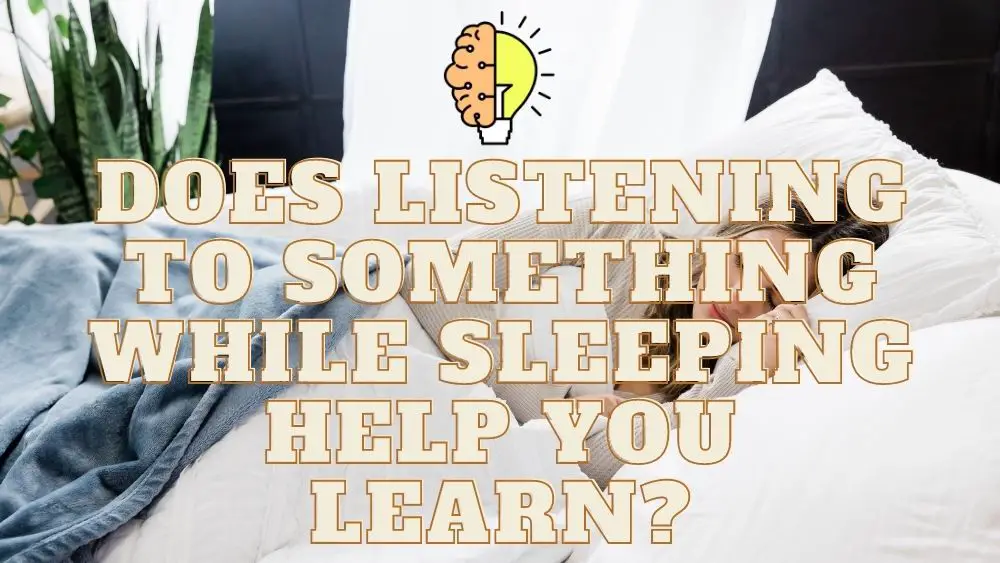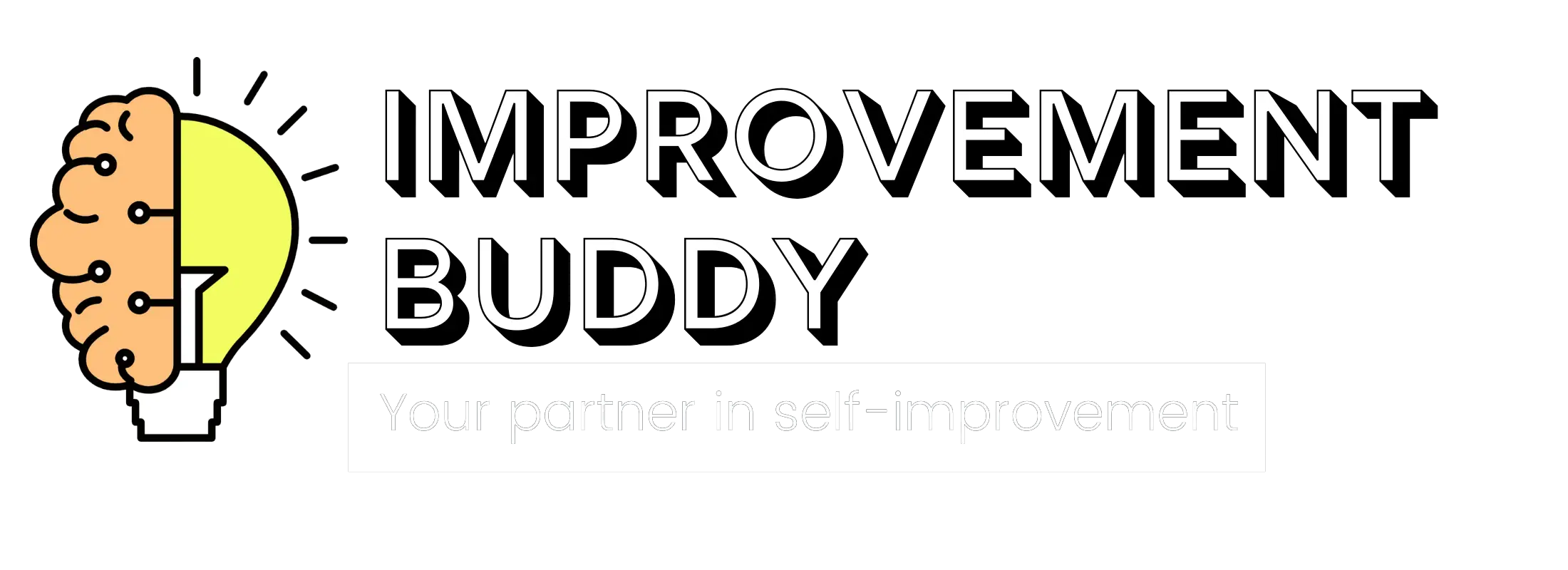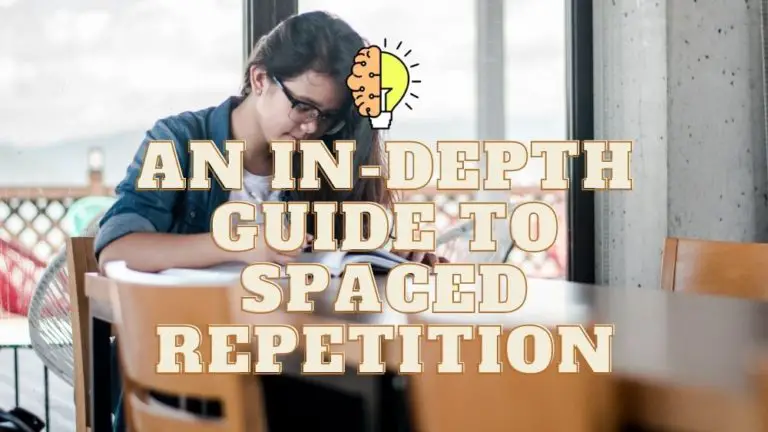Does Listening to Something While Sleeping Help You Learn?

This post contains affiliate links.
Don’t you sometimes wish that you could just listen to your lectures and classes while sleeping and wake up completely prepared to take the quiz without even studying? I think we’ve all wished that at some point, hoping we could just skip the grueling study part. But is that possible?
In general, listening to audiobooks, podcasts, and other learning materials while sleeping does not help you learn. To learn, you need to pay attention to the information first. Sleep only helps consolidate the information after learning it.
Ahead, we’ll talk more about sleeping and learning in more detail. I’ll share with you some studies that support the ideas presented in this post.
The Different Types of Sleep
We all know that memory and learning both depend on a good night’s sleep, and it’s why we’ve always grown up with someone telling us to have a “good night’s rest” before a major exam or sports game.
But did you know there are different types and stages of sleep? Knowing each stage helps us understand better exactly which stage our brain can best receive information from while asleep.
There are two main types of sleep, which is rapid eye movement (REM) and non-REM. Each of these is linked to a specific brain wave and neuronal activity.
Now let’s dive into the stages of sleep, according to the National Institute of Neurological Disorders and Stroke.
Stage 1 – This is non-REM’s first stage, which is essentially the line between wakefulness and sleep.
This is the stage when your entire body system (breathing, heartbeat, etc.) begins to slow down, shifting from daytime activity to sleep. This is also where you’ll find more body twitches as your muscles begin to relax.
Stage 2 – In this non-REM stage, your body falls into deeper sleep, and your breathing and heartbeat slow down even more. Your muscles relax further, your body temperature drops, and your brain wave activity slows down. However, there are still brief bursts of electrical activity and is actually the stage where you spend the most time.
Stage 3 – This is the non-REM period that you need to be having if you want to feel refreshed in the morning, and is where your heartbeat and breathing slow down to their lowest levels. The brain waves here become slower.
REM sleep – Finally you’ve reached REM sleep, which happens about 90 minutes into falling asleep. Your eyes move rapidly from side to side, and everything in your body rises again to that of wakefulness, even though you’re asleep.
Your brain wave activity rises as you dream, and your breathing and heart rate also increases. Your arm and leg muscles become temporarily paralyzed in this stage, so you can’t really act out your dreams.
Now, why is it important to know this? It’s quite simple.
If you need more rest in order to be refreshed the next day, you’ll need to be in the third and last stage to accomplish that, which means total relaxation, and you’ll need more than a few minutes of “power nap.”
But if you want your brain to process memories while asleep, studies say that it’s best to do it in the second stage of non-REM sleep.
There are studies that show that non-rapid eye movement (or non-REM) sleep is crucial for keeping memories, specifically, using the sleep spindles.
Sleep spindles are defined by the Encyclopedia of Sleep as “sudden spikes in oscillatory brain activity seen on the electroencephalogram during the second stage of non-REM sleep,” and are implicated in processing information acquired during the waking or active period.
Moreover, scientists have been able to choose and solidify certain memories while asleep. And until today, no one knew exactly how this worked.
By the way, if you want to learn more about the power of sleep, I highly recommend Dr. Matthew Walker’s book Why We Sleep. It is, by far, one of the most eye-opening books I’ve read about sleep. You can listen to the audiobook version for free by signing up for Audible’s 30-day free trial (for non-Audible members only).
Learning New Information While Asleep
People from all walks of life, from artists to scientists (even students), have long been fascinated by the concept that we can learn while we sleep.
This is actually a term called “hypnopedia”, or “sleep-learning,” and has a long history dating all the way back to 1914 when German psychologist Rosa Heine found that learning new information at night before going to sleep results in better memory retention compared to learning during the day.
Since then, many types of research have been done to correlate sleep with learning, and now we know for a fact that sleep is crucial for learning because it rests the brain and helps clear your mind for better recall.
The answer has always been learning before or after sleep, and now questions arise to see if we can do it while sleeping.
The prospect that we may all benefit from learning while we sleep sounds wonderful. But is it possible that such a thing will ever come to pass?
In many countries, there’s a joke among students that using your notes from lectures or classes as a pillow when sleeping helps process information into your brain via “osmosis.”
It’s a funny and silly thing because we all know it doesn’t really work that way, but what if there was a way you could actually learn something in your sleep?
Actually, after many years of experiments and even pseudoscience, scientists have concluded that you can’t learn advanced information while you sleep and that anything their participants learned during sleep was because they were temporarily awake during the part of learning.
This just means you won’t be able to learn new calculus formulas while asleep since it’s an advanced concept that requires your brain to be alert and at full attention in order to process it.
It would be a dream come true for most people, knowing you don’t have to be awake to go through the grueling process of studying, but sadly, that isn’t the case.
Also read: Can You Get Smarter Without Studying?
New Findings on Sleeping and Learning
However, it doesn’t just end there. In recent years, new research has shown that the brain is not a complete failure at learning during sleep.
They have found that it is possible for the slumbering brain to absorb information and even create new memories. But here’s the catch; the memories are implicit, or unconscious.
In other words, this form of learning is the most basic, which is much more simple compared to what your brain has to go through in order to learn Italian or calculus.
Remember what I said about scientists being able to choose or solidify new memories during sleep? They do that by association.
In one of their experiments, they played a certain tone while the participant was asleep, and immediately released a nasty spoiled fish smell. When the participant woke up, the scientists played the tone again for them to hear and they held their breath in anticipation of a bad smell.
This is the body’s basic learning mechanism, using association in a form of basic learning, and creating a new memory. In this case, the new memory the brain formed is that the specific tone is connected to a nasty smell.
Again, the part of the brain responsible for this is the sleep spindles, and this is what led to several groundbreaking research many use to base the benefits of a “good night’s rest” on.
Sleep is the Key to Effective Memory Consolidation
Now if you can’t learn new advanced information while asleep and can only learn basic information via association or implicit memory, the big question is how can such mechanisms help with memorizing new and advanced information?
The good news is, that a successful group of researchers from the University of York and the University of Birmingham in the United Kingdom found something extraordinary about this, and you can find their findings published in the journal of Current Biology.
In an interview that Medical New Today did with the co-head of the research, Scott Cairney, you’ll be amazed at what they’ve found out.
When asked for the motivation for this research, Cairney explained, “We are quite certain that memories are reactivated in the brain during sleep, but we don’t know the neural processes that underpin this phenomenon.”
“Sleep spindles,” he continues to explain to them, “have been linked to the benefits of sleep for memory in previous research, so we wanted to investigate whether these brain waves mediate reactivation.”
He then added, “If they support memory reactivation, we further reasoned that it could be possible to decipher memory signals at the time that these spindles took place.”
In order to test their hypothesis, Cairney and his fellow colleagues asked 46 participants to learn some connections or associations between words and pictures of objects or scenes before they sleep.
Specifically, they requested their participants to associate an adjective with an object or scene pictures, and then they split them into two groups.
The first group would take a 90-minute nap, and the second would stay awake for the duration.
To those who napped, Cairney explains that half of the adjectives or words were replayed during their nap in hopes of triggering the reactivation of the newly-learned picture or scene memories.
The results were phenomenal.
“When the participants woke after a good period of sleep,” Cairney says, “we presented them again with the words and asked them to recall the object and scene pictures.”
He then concluded that “their memory was better for the pictures that were connected to the words that were presented in sleep, compared to those words that weren’t.”
So what does that tell us with regard to the big question?
It tells us that while we learn new advanced information while we’re awake, we can improve our memory consolidation with sleep.
In other words, when you’re awake, you learn new things. But when you’re asleep, you refine them.
Also read: Can Diet Improve Memory? (Here’s What The Science Say)
How Do We Apply This In Real Life?
I graduated with a degree in Physical Therapy, and one of the hardest things in my college years was trying to memorize the different muscles. If I could apply what I’ve learned now to my younger self’s study life, it would be this.
I would train my brain to associate a muscle group with a word and build anything else according to that word.
For example, I could try to associate a song with muscles, and as I get to a specific part of the song, I’d recite all I know about the muscle connected to that word.
Once I’ve learned the new associations and new information my waking brain can do that my sleeping brain can’t, I can try to sleep.
While I sleep, I’d listen to the song on repeat, and try to have my sleep spindles do their thing, as my memory is being refined more and more. When I wake up, I can practice associating the song with the muscles again with a clearer head.
We all know that a well-rested brain operates best, so saying that sleeping helps better with studying isn’t arguable at all. But now you know that listening to something while sleeping actually helps refine your memory, and it’s a game-changer.
Disclaimer, there hasn’t been enough research to prove that this works with everyone, but now you know sleep can do so much more than just give you a clear head; it gives you sharper recall and memories too.
Final Thoughts
While listening to something while sleeping doesn’t help you learn, it can actually improve your memory.
Yes, it’s sad to know that you can’t learn an entirely new language just by listening to it in your sleep, but you can still work hard and learn it while awake, and then refine your memory of it by listening to a conversation in that language in your sleep.
Learning isn’t just passive and requires some work on your part to actively intake new information. Sleep can help clear up your head and refine memories of such learning, but nothing new can be learned with sleep alone.






